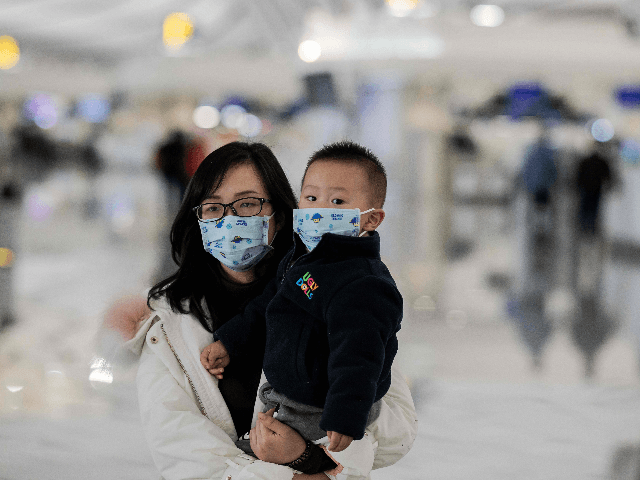Taiwanese President Tsai Ing-wen on Wednesday urged the World Health Organization (WHO) to reconsider membership for Taiwan, which has long been blocked by Beijing, in light of the virus epidemic spreading from Wuhan.
China’s efforts to isolate and marginalize Taiwan continue unabated, including provocative aerial maneuvers that are keeping Taiwan’s defense forces on high alert throughout the Lunar New Year holiday.
“Political considerations should not surpass protection for the people,” President Tsai said on Wednesday. “I want to again urge the WHO not to exclude Taiwan for political reasons. Taiwan is on the front line of global infectious disease prevention. The WHO should have a space for Taiwan’s participation.”
Taiwan reported its first confirmed case of the Wuhan virus on Tuesday. The patient is a Taiwanese businesswoman who was hospitalized after returning from a working trip to Wuhan. Taiwan banned visitors from Wuhan and nearby Chinese cities on Wednesday, followed by the cancellation of all direct flights between Taiwan and Wuhan on Thursday.
U.S. Senator Tom Cotton (R-AR) on Thursday supported Tsai’s call for Taiwanese membership in WHO, viewing the Wuhan virus as an example of how Chinese obstructionism may have already put lives at risk.
Cotton added that the Chinese Communist Party’s (CCP) continuing efforts to block Taiwanese membership in WHO during an international health crisis “show yet again that Beijing is a malign actor on the world stage.”
“Let’s hope their vindictive behavior doesn’t raise the death toll any higher,” he said.
China has been keeping Taiwan from attending WHO meetings since President Tsai’s election in 2016. Beijing portrays Tsai as a dangerous “secessionist” whose election (and now re-election) made it necessary to aggressively isolate the country. The Chinese view Taiwan as a semi-autonomous province that will inevitably rejoin the motherland, by force if necessary.
“We don’t have a need to declare ourselves an independent state. We are an independent country already and we call ourselves the Republic of China, Taiwan,” Tsai told the BBC after she was re-elected in a landslide this month. She argued her sweeping electoral victory demonstrates the Taiwanese people have little interest in China’s “One Country, Two Systems” arrangement, which they see as a disastrous failure in Hong Kong.
China is especially keen to prevent Taiwan from joining any organization with connotations of independent national status, including agencies such as WHO and the International Civil Aviation Organization (ICAO), where Taiwan’s exclusion endangers civilian lives. Keeping Taiwan out of WHO prevents the Taiwanese from receiving vital information about health crises such as the Wuah virus as quickly as possible.
Cotton is one of a growing number of voices blaming the Chinese Communist Party for the spread of the Wuhan virus, which could be much more contagious and dangerous than the CCP initially wanted to admit.
Chinese citizens themselves widely believe government secrecy and censorship are putting their lives in danger, noting that people have been arrested for trying to warn others about the emergence of the coronavirus, which the Chinese government falsely portrayed as unlikely to pass from human to human. The Chinese public was only told the Wuhan virus is communicable, and advised to wear masks to reduce the danger, two days ago.
A grim running joke on Chinese social media describes the Wuhan bug as a “patriotic” disease because, according to government reports nobody believes, it only infected people in one Chinese province before packing its bags and heading overseas to infect Taiwan, Japan, South Korea, and the United States.
The World Health Organization has been officially grateful for Chinese cooperation on the Wuhan virus so far. WHO is still debating whether to declare a rare Public Health Emergency of International Concern (PHEIC) for the outbreak.
China’s efforts to intimidate Taiwan have continued unabated throughout the health crisis. On Thursday, a group of Chinese military aircraft – including a nuclear-capable H-6 bomber – departed from several airbases on the mainland and flew close to the southern tip of Taiwan. Taiwanese defense forces said they would remain on high alert throughout the Lunar New Year holiday, an event that is also of great concern to epidemiologists because heavy travel might cause the Wuhan virus to spread.

COMMENTS
Please let us know if you're having issues with commenting.